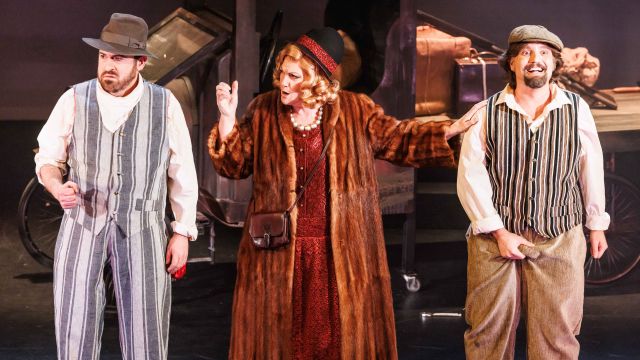The Rise and Fall of the City of Mahagonny
A spirited and full-throated production of Kurt Weill and Bertolt Brecht’s last collaboration – before the Nazis intervened – an opera that is a dark, cynical, and mocking satire of American capitalism and/or the Weimar Republic. The principal singers have great presence and things are enlivened by Christopher Hocking’s animations and news montages projected, along with narration and pointed epigrams, on a giant cyclorama. Mahagonny was first produced in 1930, but it could be just as much about now.
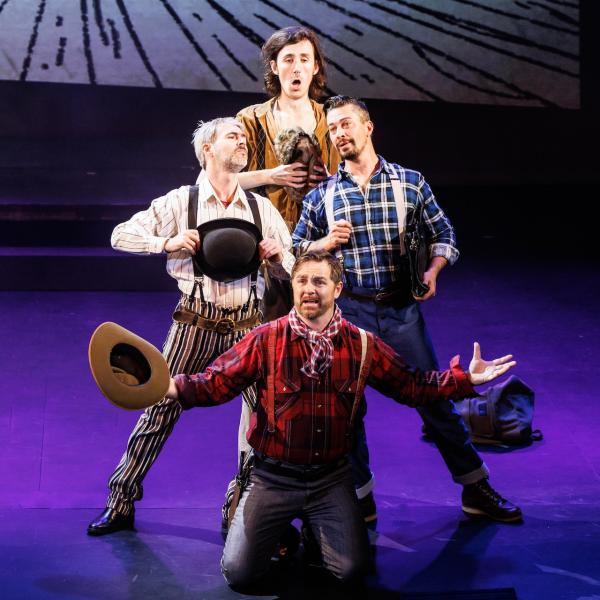
Three criminals – Mrs Begbick (Liane Keegan), Trinity Moses (Christopher Hillier) and Fatty the Procurer (Robert Macfarlane) – on the run from the cops, establish ‘Mahagonny’, a new city devoted to men’s pleasure and vices. It’s a ‘City of Nets’ into the coils of which fall our hero Jimmy McIntyre (James Eggleston) and his mates (Christopher Tonkin, Darcy Carroll and Fraser Findlay) lumberjacks flush with money come down from Alaska. Soon Jimmy is embroiled with hooker and madam Jenny Hill (Antoinette Halloran), but despite the city surviving a hurricane, Jimmy is bored and disillusioned. He adopts the credo of total freedom: every man should do just as he wants. What could possibly go wrong? Well, just about everything.
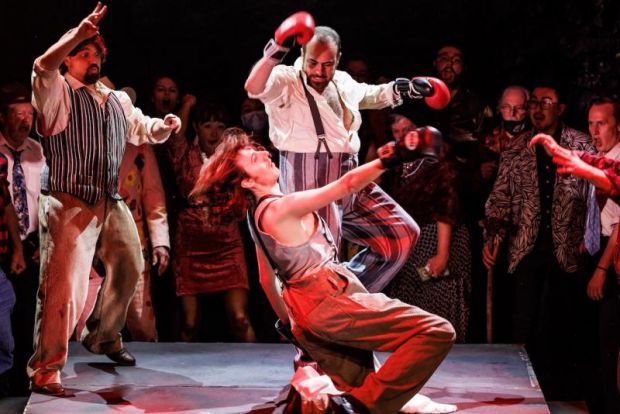
Brecht was never strong on plots; his best works (like Shakespeare’s) are ‘based on’ pre-existing material, whether he acknowledged it or not. German speaking friends tell me, in any case, that he was a better poet than a playwright – or indeed librettist. Mahagonny is not as popular (despite its revivals) as Threepenny Opera (1928) – nor as good musically or dramatically. And Threepenny Opera is based of course on John Gay’s The Beggars’ Opera, which has a plot. Mahagonny is closer to what we might unkindly call agit-prop with songs. There are ‘characters’, certainly, but they are consciously and deliberately types, conceived to represent human weakness, exploitation, greed, lust, self-interest and corruption.
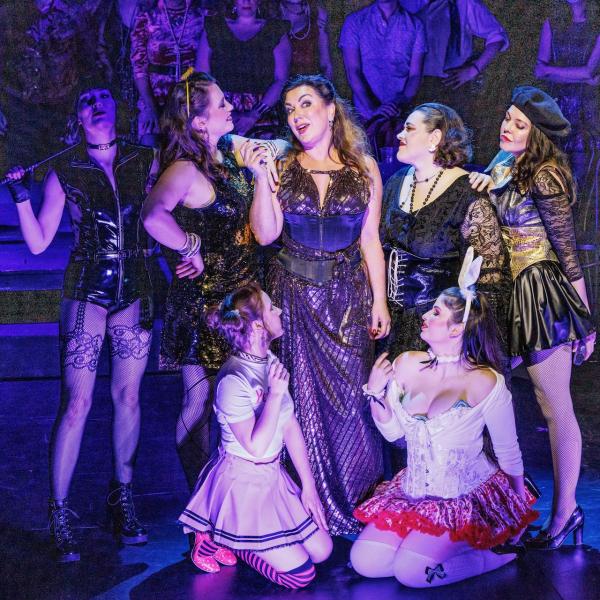
According to the background notes in the program, Mahagonny began as a ‘Song spiel’ in 1927. Weill expanded it into a full-length opera, and he insisted that it was an opera. Opera or not, Weill, like Brecht, wanted to shake things up theatrically and the score for Mahagonny is a melange of ragtime, jazz, counterpoint, and ‘classical’ music – with appropriate orchestration and instruments: a banjo or a trumpet can suddenly intrude on a passage for strings. While ‘experimental’ and stylistically revolutionary, it can also sound arbitrary and jarring – but that is intentional, preventing the audience from being lulled into mere ‘entertainment’. But I did wonder on the way through whether musician and playwright were at odds. Weill was revolutionary in his music. Brecht was revolutionary in his politics, a didactic if witty Marxist who went on to write some of the greatest plays of the 20th century.
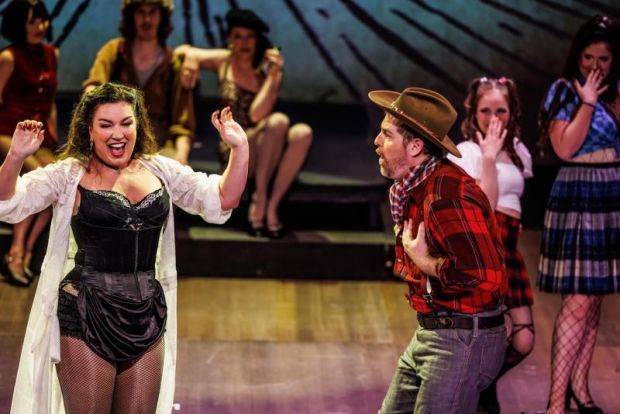
But the songs are wonderful – ‘Moon of Alabama’ and ‘Benares’ have become classics, and Jenny’s Act 2 kiss-off, ‘My Dear Sirs’, and Jimmy’s lament at the end of Act 2, ‘When the Sky is Bright’, should be classics. Antoinette Halloran has plenty of oomph and pizzaz throughout, but here she gives Jenny’s number a what-did-you-expect cruel smile with an icy anger directed at men general. James Eggleston, alone on stage, praying that dawn never comes, is allowed with this number to give us a quieter and reflective Jimmy; he connects with the audience and becomes (briefly, almost) a character. It’s the songs, I think, that are the real reason for any revival, despite the claims of contemporary ‘relevance’ and ‘biting satire’, the latter being of the blunt instrument type.
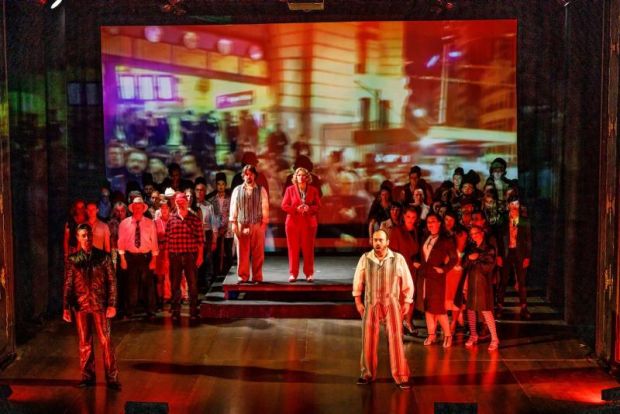
A couple of flaws, however, mar this otherwise fine production. First, the director and producers have chosen the Jeremy Sams’ translation, created for the Royal Opera ‘to enhance the immediacy of the work’ – according to the director’s program notes. Brecht is notoriously difficult to translate, but while Mr Sams has a glittering list of credits, I’d question whether his translation here always quite fits the music. The singing, although done by an accomplished, highly experienced cast, seemed to me to be sometimes pushing too hard and consequently lacking in variation.
Related to those things, and most serious of all, I found that I could not understand two thirds of the lyrics – and the lyrics here are vitally important. Was I sitting too close to the orchestra – four rows from the front? Was it just me? At interval, I checked with others. No, they couldn’t understand the lyrics either. Obviously, this diminishes the experience – and the opera’s import – considerably. If the producers and director want to go the whole opera route, might they consider surtitles?
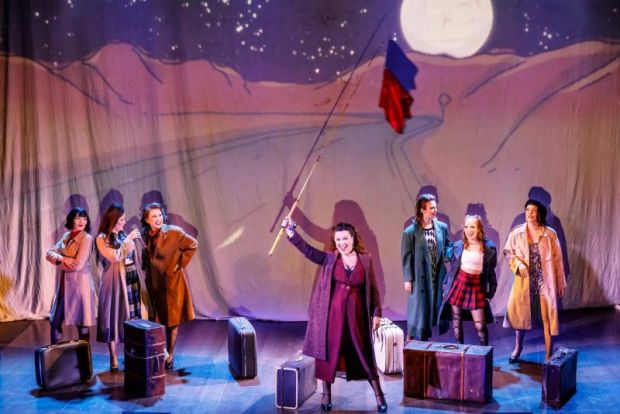
Nevertheless, the show survives these problems, and the audience clearly had a very good time – strangely undisturbed by the opera’s bleak ‘message’. And good on IOpera and Melbourne Opera for tackling and mounting this huge and difficult work.
Michael Brindley
Subscribe to our E-Newsletter, buy our latest print edition or find a Performing Arts book at Book Nook.

